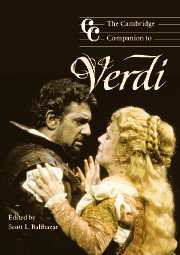Book contents
- Frontmatter
- Part I Personal, cultural, and political context
- 1 Verdi's life: a thematic biography
- 2 The Italian theatre of Verdi's day
- 3 Verdi, Italian Romanticism, and the Risorgimento
- Part II The style of Verdi's operas and non-operatic works
- Part III Representative operas
- Part IV Creation and critical reception
- Notes
- List of Verdi's works
- Select bibliography and works cited
- Index
3 - Verdi, Italian Romanticism, and the Risorgimento
from Part I - Personal, cultural, and political context
Published online by Cambridge University Press: 28 September 2011
- Frontmatter
- Part I Personal, cultural, and political context
- 1 Verdi's life: a thematic biography
- 2 The Italian theatre of Verdi's day
- 3 Verdi, Italian Romanticism, and the Risorgimento
- Part II The style of Verdi's operas and non-operatic works
- Part III Representative operas
- Part IV Creation and critical reception
- Notes
- List of Verdi's works
- Select bibliography and works cited
- Index
Summary
Among its other meanings romanticism has assumed that of a special relationship or bond between intellectuals and the people, the nation. In other words, it is a particular reflection of “democracy” (in the broad sense) in literature … And in this specific sense romanticism has never existed in Italy.
The writings of Antonio Gramsci might seem a strange place from which to launch a consideration of the vexed topic of Verdi's ties to the Risorgimento, particularly since Gramsci disapproved of opera and never had anything kind to say about Verdi. He did, however, possess a visionary understanding of the role of culture in nineteenth-century Italy, one all the more revealing for its unfriendliness to Verdi. Gramsci saw the popularity of opera in Italy as both a substitute for and an impediment to the development of his preferred vehicle for Romantic sentiment, a popular literature that demanded a solitary and reflective mode of consumption diametrically opposed to the experience of the opera house. His suspicion of opera was aroused partly by ties he perceived between operatic song and an oratorical style that reminded him of fascist speechifying: elsewhere in the Prison Notebooks he lamented the “operatic” taste of the “man of the people,” who seeks in poetry only the singsong rhymes and “hammering of metrical accents” that he enjoys in popular oratory. It was this willingness to be swept away by the “operatic,” Gramsci argued, that militated against the formation of what he called a “national-popular” style of literature in Italy and against a truly popular Romanticism.
- Type
- Chapter
- Information
- The Cambridge Companion to Verdi , pp. 29 - 46Publisher: Cambridge University PressPrint publication year: 2004
- 6
- Cited by

